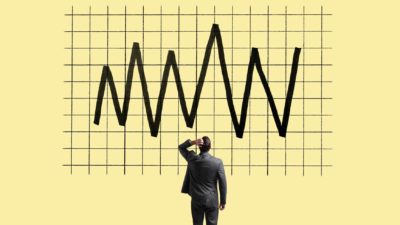Alright, you lot. Bring it in tight.
This piece is slightly longer than normal. But I need you to do me a solid favour, and read it all.
See, we need to chat about what's happening on the ASX at the moment.
Yes, I wrote about it yesterday, but based on some comments on Twitter and Facebook over the last 24 hours, I thought I'd go back to the well again today.
I want to cover two particular bits of ground.
First, volatility. Then, perspective. Let's get to it.
Here's what I need you to understand. As in, properly grasp and internalise:
"Volatility is the ticket to the dance."
Without uncertainty, there is no opportunity for gains. Without a market, there is no opportunity to buy and sell. And, frankly, whenever there is a market there are so-called 'animal spirits'.
Which are?
Greed. Fear. Exuberance. Panic. Overconfidence. Timidity. Ego. Hubris. Humility. I could go on, but you get the idea.
Never, for a second, think that the market is 'smart', or knows anything.
In fact, there is no such thing as 'the market'.
There are just people, buying and selling, on any given day.
Because here's the thing: on any given market day, some huge percentage (probably 99%) of shareholders neither buy, nor sell. We just hold.
The market price isn't set by us.
It's set by the people who actually transact on that day.
If 99% of us do nothing, but 1% of us freak out at some news (or worse, just because others are), the price can fall significantly. But that's not the value of the company… just the price at which two people decided to transact.
Let me put it another way: If the bloke next door to you, in a fit of madness, sold his house at half of its real value, does that make every other house on your street worth less? Of course not.
And yet, that's how we think and talk about share prices!
(And, for balance and in the interest of education, if he was able to con some sucker into paying double its real worth, your house isn't suddenly worth twice as much either. The same is true of share market bubbles, too, when they occur.)
It's true that sometimes you can't get anyone to pay what you think is fair value. So, if you need the money immediately, you'll have to take a haircut. But that's why I repeatedly tell you to only invest money you don't need for at least three years, preferably five.
Because, if you have that sort of timeframe, you can simply ignore the market shenanigans and ridiculousness.
(And, it goes without saying that if you don't have that sort of timeframe, you have no business owning shares. Seriously. You're asking for trouble.)
I've had a few people on Twitter tell me that 'the run is only just starting'. Or that there's a bloodbath coming. Or whatever.
My stock response: "Your crystal ball must be better than mine".
Meaning? Meaning no-one knows what's coming next. Maybe the ASX goes up today. Maybe it closes down another 3%. Or more. Or less.
No. One. Knows.
(If you think you do, can I humbly suggest a little more humility? And if someone tells you they know, can I humbly suggest you ignore them?)
But here's the other thing: if you're an investor, you simply need not care.
Don't get me wrong; losses, even on paper, hurt. I hate seeing my portfolio value fall.
So maybe saying 'you need not care' is too unrealistic.
I mean, try to learn not to care, if you can.
But in the meantime, just cop the pain on the chin, and remind yourself why you own what you own, and that you're a long term investor.
See, a share price, in theory, should represent all of the future earnings of a company, bundled together. (Mathematically, they're then 'discounted back' to recognise that $1 today is worth more to me than $1 in 20 years time, but we can skip that bit for our purposes, today).
Now, take Woolworths Group Ltd (ASX: WOW). Its shares are down almost 5% since last Thursday.
But have the company's future profits somehow fallen by 5% since then? Did someone all of a sudden realise that they'd made a mistake in their spreadsheet that needed correcting, and then let the rest of us know?
Of course not!
So how can Woolies suddenly be worth 5% less?
Clearly, it can't be.
It's possible that the share price was too high on Thursday, and maybe the market has realised its mistake.
It's possible that the market has overdone its pessimism, and now Woolies shares are too cheap.
It's possible that it's a bit of both.
But isn't it more likely that the share price is just caught up in some good old-fashioned fear?
I think that's most likely.
Now, if you didn't think Woolies was worth $34.83 on Thursday, presumably you didn't buy them, or you had already sold them.
But if you did think they were worth $34.83, and the company's long term prospects are essentially unchanged since then, why should you care that the market told you they were only worth $33.31 at the close of trade yesterday?
There is one reason to care, actually: you should have been happy that you get the opportunity to buy more at a discount, not unhappy that some faceless, nameless desk jockey in front of six computer screens got caught up in a groupthink doom-loop!
I think you get my point. Just because others are selling, doesn't mean you should. If you know what you own, you like what you own, and you think today's price is a good one, you can simply ignore the sideshow (and the ridiculously over-hyped headlines of doom and gloom).
Now, let's get to perspective. (I tried to make this bit shorter, but I failed. Please keep reading, anyway!)
The headlines are full of breathless reporting of 'bloodbaths', 'routs', 'crashes' and the like. They'll tell you how much has been 'wiped off' the market, measured in tens or hundreds of billions of dollars in a single day, or a few trading days.
It is, of course, a nonsense.
Can you imagine if your house price was calculated and quoted daily? Or the 'value' of the local cafe or newsagent. We'd rightly laugh and call it stupid.
We should do that for shares, too.
But here's the other thing: After this 'bloodbath', the S&P 500 – the preeminent US stock market index – is back to where it was in… May. Yes, three short months ago.
Does that sound like a disaster to you?
And where does it leave the S&P 500 over the past year? Up 14%.
The Aussie market is apparently up 4.4% over the last year, after a few days of falls. Add in dividends and you get pretty close to the long term average of 9%!
(The market rarely gives us 9% in any given year, by the way. It's usually higher or lower, because, well, that's just what the market does. Volatility, remember!)
So all of this noise and carry on… for a good-to-very-good 12 month return.
Storm, meet teacup.
And even a year is too short a measurement. The roughly 9% long term annual average return has come despite the market falling about one year in every three. And despite wars, recessions, a Depression, geopolitical risk, and almost constant fear-mongering headlines.
(Remember, our minimum investment horizon should be at least five years!)
Again, I can't help you not care when uncomfortable times hit. But I can help you keep it in historical and current perspective.
If no-one can tell you what's going to happen tomorrow, next week, next month or next year, you have two choices: never invest (because the next fall could be right around the corner), or invest anyway (because the market has always gone on to higher heights, and I don't think it's done, yet).
What happens next? I have absolutely no idea. These falls could continue for days, weeks or months. The GFC falls went on for more than a year. That sucked. Or, the market could erase all of these losses by this time next week, month or year.
I don't know, and nor does anyone else.
Should you sell, just in case the falls continue? I mean, you could… but there's been reasons to sell every day, week and year… forever.
And ironically, the further markets have fallen, the greater the upside if (I think when) it goes on to higher heights.
If you believe the market is going to set new highs, in future, trying to guess where 'the bottom' is is a mugs game: maybe you're right. Or maybe you take too long: During the COVID crash in 2020, many smart people decided to not buy until the pandemic was over. By which time…
According to the Federal Government:
"On 20 October 2023, Australia's chief medical officer declared that COVID-19 is no longer a Communicable Disease Incident of National Significance".
By which time, the ASX was up almost 40%. That was a lot of gain to give up while you waited for the coast to be clear.
Look, you can try to time the market if you want. I don't know many people who can do it successfully, and there are many, many, many more who try and fail… but that's up to you.
Me?
I'm doing two things:
First, I'm making sure I know what I own, and why I own it. And I'm making sure that the companies' long term futures are fairly reflected in share prices.
Second, I'm reminding myself that over the 30 years to June 30, 2023 (the latest dataset available from Vanguard), the ASX turned a hypothetical $10,000 into over $130,000.
You reckon people were worried during those 30 years? You betcha. Were there 'bloodbath' days, and big falls? You bet.
That timeframe includes the Asian Currency Crisis (you probably don't even remember that), the Bali bombing, the second Iraq War, the GFC, the Boxing Day and Japanese tsunamis, Brexit, and yes, COVID.
And yet, people are carrying on about this?
It's possible that some of the falls are because some companies were overvalued and too hype-y. That's cool. If you owned them, it might have been a mistake to buy or hold them at higher prices. And yes, when those sorts of companies' share prices fall, we shouldn't expect them to recover.
But if that's the case, the mistake was in paying too much or holding too long in the past. Yes, if they're still overvalued, you might consider selling. But because they're overvalued, not because the price has fallen!
But if you don't own those companies?
Let me be clear. It's possible share price falls get worse. Maybe a lot worse. It's possible they stop. Maybe even recover. But whatever they do, it's a sideshow.
It's a distraction from the business of investing.
We should buy shares when the prices are attractive relative to the long term future of the company. We should hold them as long as that remains the case. We should sell when it's no longer the case. But only then.
Not when prices fall.
Not when the headline writers pull out the large fonts.
Not when the bloke on Twitter or the telly tells you that 'these falls could continue'.
The investor has nothing to fear from falling prices, unless they are caused by falling long term future prospects of the companies themselves.
Indeed, the long term investor should be pleased to be given the opportunity to buy shares at a discount, when that's the case.
Because, that's who we are. Me and, I hope, you, too.
If you're reading this; and if you're following me and/or The Motley Fool on social media or on TV and radio, I hope it's because you're someone who sees the value of long term investing.
It doesn't mean you don't get scared by falls. It doesn't mean you don't want reassurance. That's exactly why I'm writing this. But I want to remind you of the race we're running.
We are Aesop's tortoise. Not his hare.
We aim to win, over the long term, by buying quality businesses at good prices and letting time and those businesses do the rest.
We have nothing to learn from breathless reporting, day-traders, or market-timers.
We're business owners, each owning small pieces of listed companies.
We've got this. We're staying the course, knowing that volatility is unavoidable, and that the spoils of endurance are worth the trials.
Fool on!









